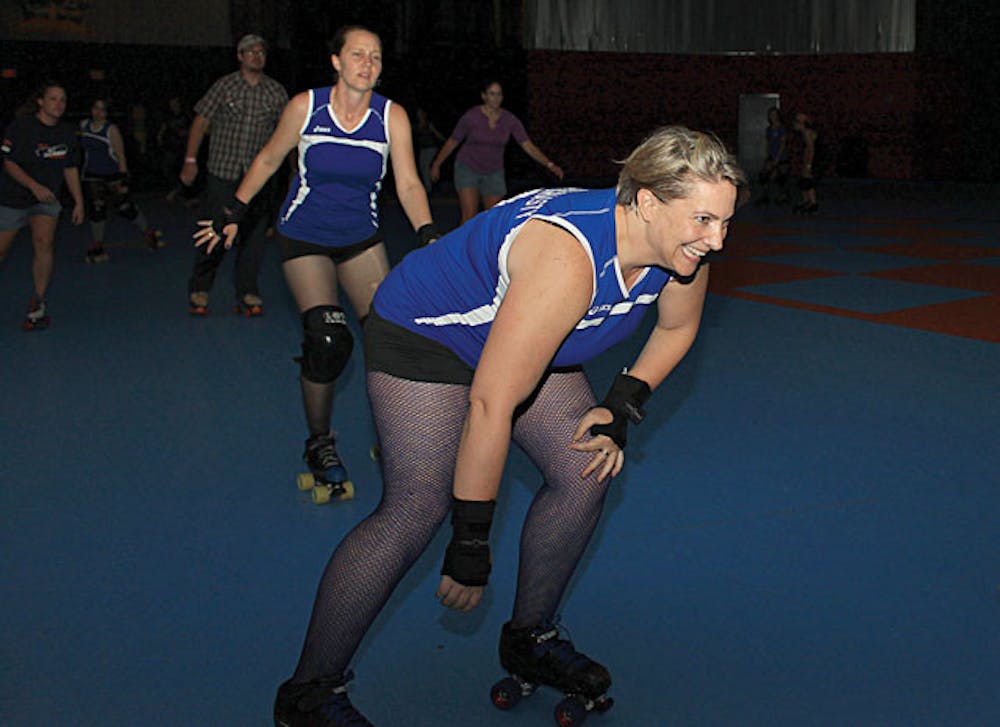By day, Adrienne Filardo, 22, works as a grant assistant in the UF Department of Neurosurgery. On a typical day of work, she wears a cardigan, skirt and pantyhose – looking “as June Cleaver as possible,” she said. But three nights a week, donning fishnet stockings, short shorts and a thick layer of purple eye shadow, she is Rage-rienne, the roller derby girl, acting as a blocker for her team, the Gainesville Roller Rebels.
Roller derby is an all-women’s sport in which two five-girl teams skate around an oval track. Four members from each team, the blockers, guard against the opposing team’s spring skater, the jammer, to keep her from lapping them. Each team scores one point for each time the jammer laps the opposing team, according to the team’s website, www.gainesvillerollerrebels.com. A roller derby match is known as a bout.
Rage-rienne, the team’s sponsorship and media relations manager, was one of the Rebels at Skate Station Funworks, 1311 NW 76th Blvd., who—despite their appearance as a group of punk-rock Sonic waitresses, some with tattoos showing through their stockings and sleeveless black T-shirts were flashing encouraging smiles at a group of new recruits.
She said most of the team, ages 18 to 49, hold day jobs as homemakers, teachers and UF staff members.
The Rebels went around the room introducing themselves to the recruits by their derby names: Stocky Balboa, Sara Leethal, Dr. PopHer, Suzie Bonebreaker and Zelda Shagnasty (No. 69).
Guided by members of the team, the derby girls-to-be looked over their waiver forms, which included guides on what protective gear to buy, how to eat before a bout and the rules of the game.
One recruit, Marta Puyana, a 39-year-old local high school teacher, said she was surprised at how detailed the form was. She said she decided to check out the team when she found out the derby was an all-women’s sport that emphasized camaraderie. She would not name the high school where she teaches.
“It’s like a whole other family,” said Sarah Purcell, 29, a veterinary technician in exotic and wildlife medicine at UF, known on the track for two years as Sara Leethal (she said she wears scrubs by day and hot pants by night).
“It’s a lot of powerful women,” she said.
Filardo said the friends she made through roller derby played a large part in her decision to join the team. “In derby with your teammates, there’s no such thing as TMI,” she said. “We play together, get hit together, win and lose together.”
After reading over the form, the recruits suited up and skated out to the rink for their first night of what the league calls “fresh meat training,” a three-month training period where new skaters learn the techniques and rules of the sport, then take an exam on their new skills before they can compete in their first bout.
After fresh meat training, the girls are allowed to choose their derby names and numbers.
Another recruit, Lauren Ashley, 22, said she has been to two or three recruitment nights. She has not turned in a waiver to start training. She said her feet, thighs and hips were aching after a just a few minutes on the rink.
For now, she said, skating in an hour-long bout is a far-off goal.
“I‘m just trying to stay up,” she said. “All of us haven’t skated since we were like 10.”
Filardo said because of the demanding nature of the sport and the 20 hours of training a week, eight out of every 15 to 30 recruits stick with it.
“A lot of people just aren’t prepared for how much time it’s going to take and how much it’s going to hurt,” she said, after mentioning a grapefruit-sized bruise on her thigh from a recent practice.
Purcell said the hardest part for new skaters is their first fall on the track.




